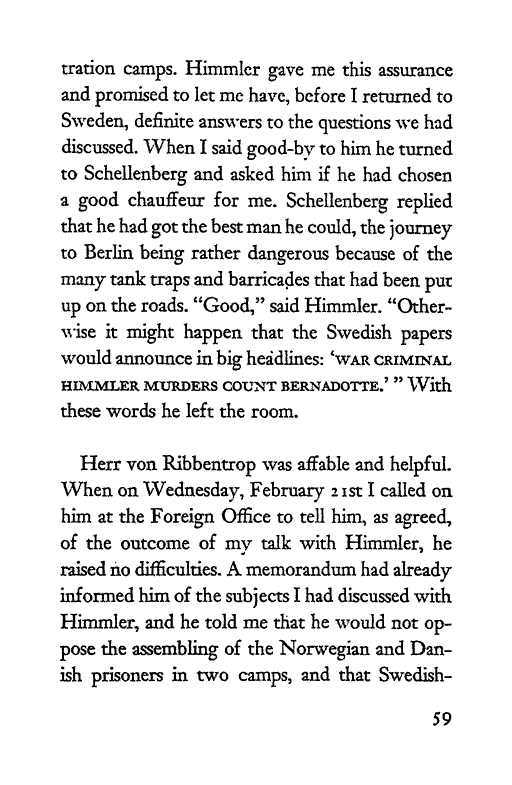Note: Translator Eric Lewenhaupt died in 1968, less than 70 years ago. Therefore, this work is protected by copyright, restricting your legal rights to reproduce it. However, you are welcome to view it on screen, as you do now. Read more about copyright.
Full resolution (TIFF) - On this page / på denna sida - Hohen-Lüchen February 1945

<< prev. page << föreg. sida << >> nästa sida >> next page >>
Below is the raw OCR text
from the above scanned image.
Do you see an error? Proofread the page now!
Här nedan syns maskintolkade texten från faksimilbilden ovan.
Ser du något fel? Korrekturläs sidan nu!
This page has been proofread at least once.
(diff)
(history)
Denna sida har korrekturlästs minst en gång.
(skillnad)
(historik)
concentration camps. Himmler gave me this assurance
and promised to let me have, before I returned to
Sweden, definite answers to the questions we had
discussed. When I said good-by to him he turned
to Schellenberg and asked him if he had chosen
a good chauffeur for me. Schellenberg replied
that he had got the best man he could, the journey
to Berlin being rather dangerous because of the
many tank traps and barricades that had been put
up on the roads. “Good,” said Himmler.
“Otherwise it might happen that the Swedish papers
would announce in big headlines: ‘war criminal
himmler murders count bernadotte.’” With
these words he left the room.
Herr von Ribbentrop was affable and helpful.
When on Wednesday, February 21st I called on
him at the Foreign Office to tell him, as agreed,
of the outcome of my talk with Himmler, he
raised no difficulties. A memorandum had already
informed him of the subjects I had discussed with
Himmler, and he told me that he would not
oppose the assembling of the Norwegian and
Danish prisoners in two camps, and that
<< prev. page << föreg. sida << >> nästa sida >> next page >>